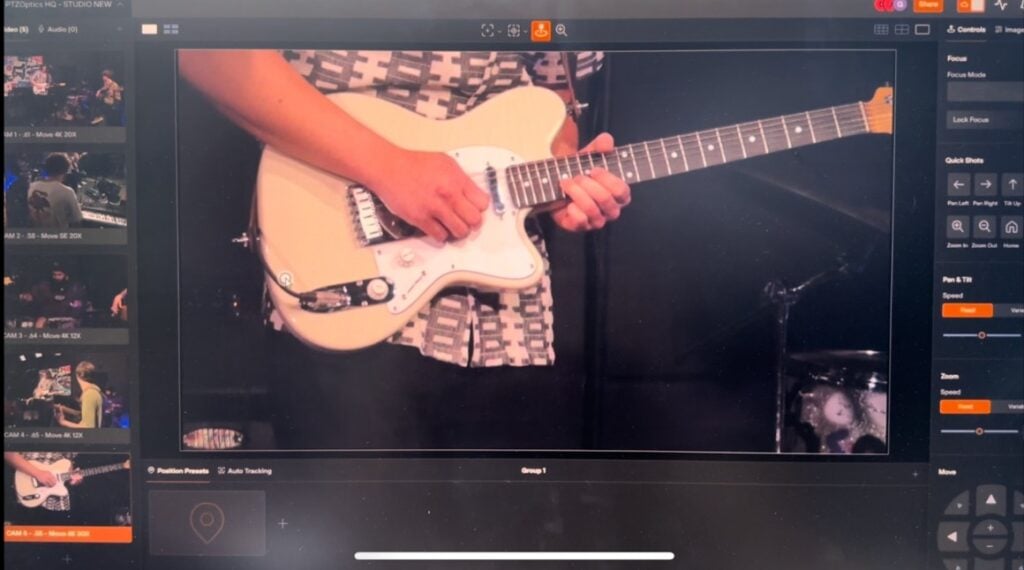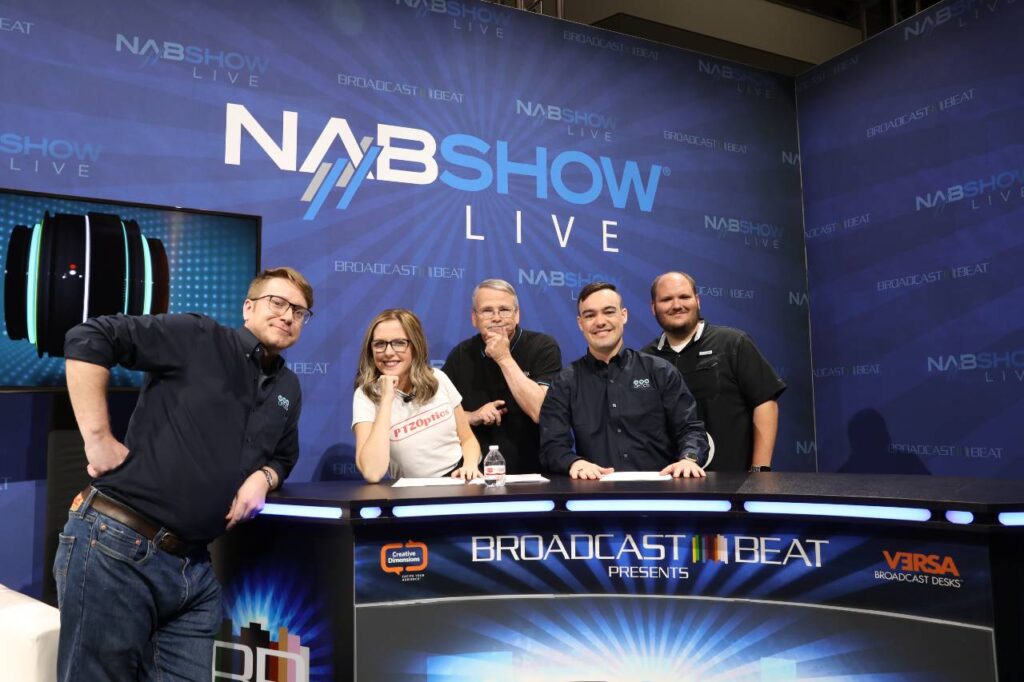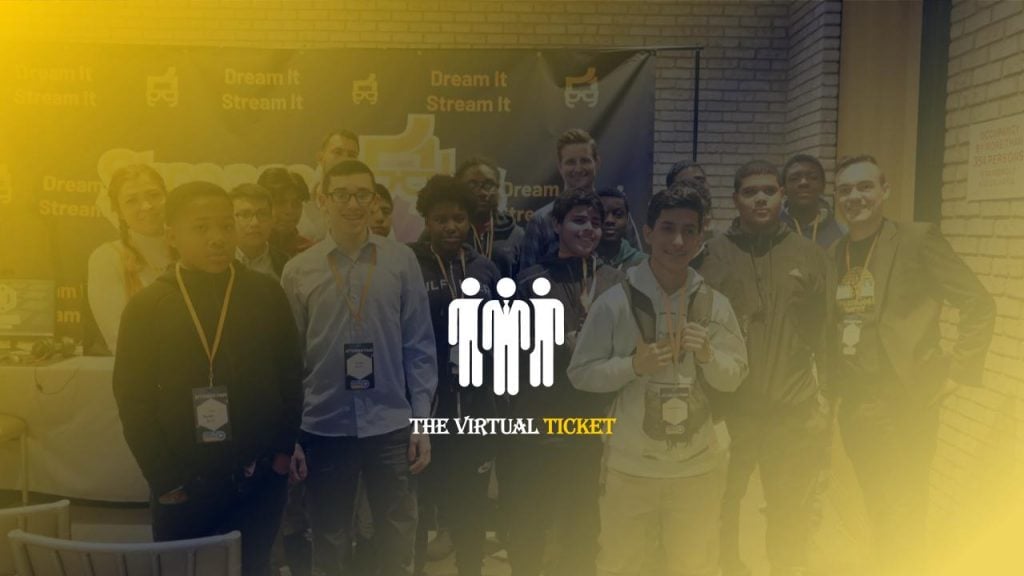Preparing Your Event for a Live Stream
Written by Paul Richards on March 21, 2020
Attending an event is always more exciting than the process of planning it. Nobody minds going to a party, but who wants to deal with all the little details about cleaning the venue, making sure there is good parking or proofreading invitations before they are sent out. However, even though the activities that take place before an event are not exciting, they lay the groundwork for how enjoyable the actual event will be. As an event planner, if you want to enjoy the event, you must pay attention to planning it. And no aspect of planning is more important than the pre-planning. This is when you decide why you want to have the event, who the audience will be, and if you can pull it off with the resources you have available to you.
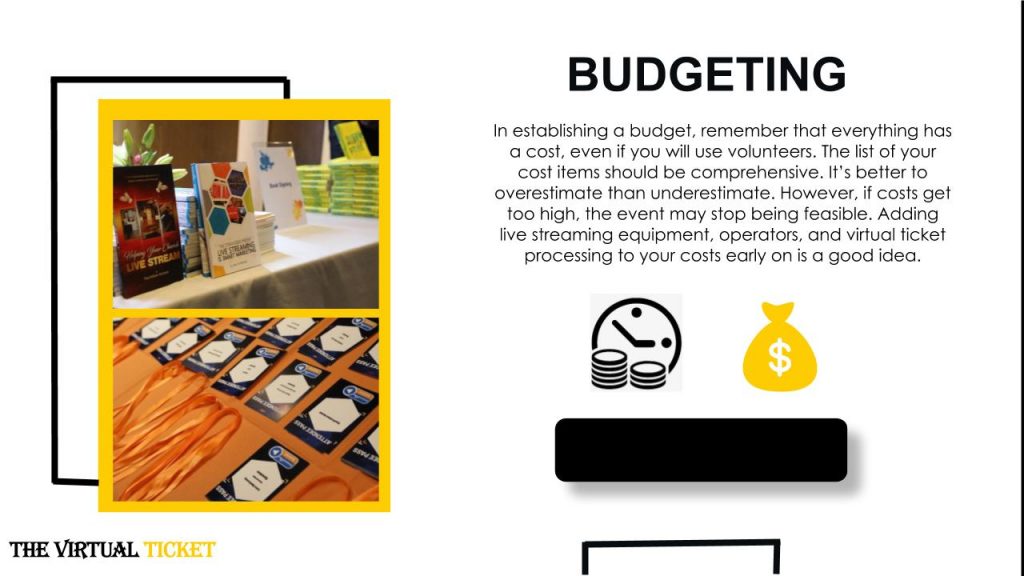
budgeting for live streaming an event
Event Feasibility
Event Goals & Objectives: Why Is The Event Important?
There is nothing worse than an ill-conceived event. It is not uncommon for individuals and businesses to decide on a spur of the moment to have an event. When you are planning an event it’s all about asking the right questions and defining your expectations. It’s important to understand during the pre-planning stages that the event objective will likely change over time. You may even decide to abandon the project for various reasons along the way. Think critically about your event because the first time will likely be the hardest. Future events will be much easier to host once you have established the event framework. Some things will only become clear to you during the planning process. Others may not become clear until after your event is over. The goal of pre-planning is to uncover as much information as possible to steer your event toward a successful future.
Determine the business problem your event will solve. This is the most important step of any event because it will help to secure the event’s success for yourself and the attendees. The business problem or the need which an event aims to satisfy helps to confine your efforts during the planning stage to only what is valuable for fulfilling that outcome. Think about your online audience during this process. Will you be able to give online viewers access to an experience that fulfills their expected outcomes? You can assume online viewers understand they will not have access to in-person experiences such as networking. But can you compensate them in some ways by providing behind the scenes access to the keynote speaker? Perhaps your virtual ticket holders can ask questions during the presentation’s Q&A session. Are there ways that you can give your virtual ticket holders a private online group for networking with attendees online? After all, LinkedIn has over 660 million members. Perhaps you can create a LinkedIn networking group to help encourage collaboration for members of your event. To determine if the event will become a successful business, ask the following questions (unless the event is something personal, like a wedding, retirement party or a hangout for family and friends):
- Who needs what the event offers?
- Are there enough of these people to justify holding the event?
- How many in-person attendees do you estimate versus virtual attendees?
- Do you have the means to reach these people?
- Will the outcome justify the effort and cost of creating the event?
- Do you have the capacity to hold such an event?
- Should you have the event?
The more painstaking and exact the answers to these questions are, the greater clarity the project will have, and the more guided future decisions and actions will be (Spradlin, 2012). During the research for writing this book, I was fixated on hosting an event in New York City where the virtual ticket experience would come as close as possible to the in-person experience. While the event was a massive success for all parties involved, I realized only after the event that an all-online approach could cost one fifth the price and potentially reach more people. Four months later, the StreamGeeks hosted the 2020 Worship Summit which sold more virtual tickets than the StreamGeeks Summit in less time with a much lower budget. It was interesting to see the highest ROI came from catering directly to an online audience.
Write down your answers to the questions about the event. The next step is to crystalize your ideas by making them more specific in terms of time, budget and other resources. What are the things you need to successfully hold this event and are they readily available? If they are not available, can they be obtained?
Event Budget Planning
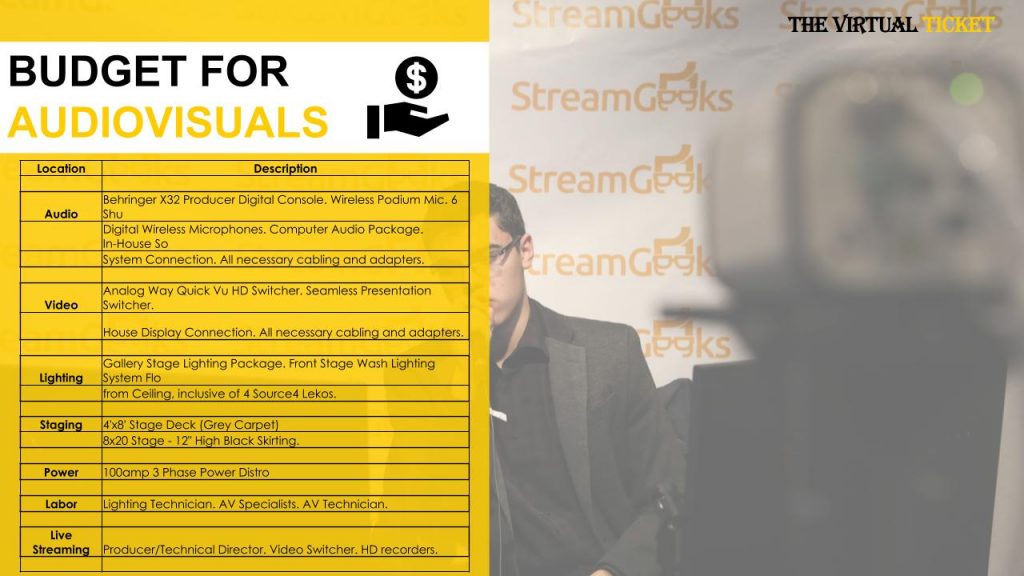
Cost for Live Streaming an Event
In establishing a budget, remember that everything has a cost, even if you will use volunteers. The list of your costs should be comprehensive. It’s better to overestimate than underestimate. However, if costs get too high, the event may stop being feasible. Adding live streaming equipment, operators, and virtual ticket processing to your costs early on is a good idea. You will have to come up with a balance between your expected virtual ticket sales and the cost of adding live streaming to your event. Some events now add live streaming as a free promotional tool and absorb the costs for live streaming the event. Proper costing involves a detailed breakdown of all that is needed for the event, attaching a monetary value, and then making room for contingencies. Having access to someone experienced at creating such events will ensure you are moving in the right direction. Later, in this book, you will review various DIY video production systems and ballpark pricing estimates from production companies (Colston, 2018). If you are unsure about the budget for live streaming, reach out to the venues’ recommended rental/staging and AV company vendor. Below are the costs for the audiovisuals from the 2019 StreamGeeks Summit.
| Location | Description | Price |
| Audio | Behringer X32 Producer Digital Console. Wireless Podium Mic. 6 Shure Digital Wireless Microphones. Computer Audio Package. In-House Sound System Connection. All necessary cabling and adapters. | $3,140.00 |
| Video | Analog Way Quick Vu HD Switcher. Seamless Presentation Switcher. In-House Display Connection. All necessary cabling and adapters. | $2,000.00 |
| Lighting | Gallery Stage Lighting Package. Front Stage Wash Lighting System from Ceiling. | Included |
| Staging | 4’x8′ Stage Deck (Grey Carpet)
8×20 Stage – 12″ High Black Skirting. |
Included |
| Power | 100amp 3 Phase Power Distro | Included |
| Labor | Lighting Technician. AV Specialists. AV Technician. | $4,385.00 |
| Live Streaming | Producer/Technical Director. Video Switcher. HD recorders. | $5,425.00 |
| Total | $14,950.00 |
*New York City is one of the most expensive cities in the world to hire outside contractors. Prices in other cities around the world will likely be less expensive.
Sponsors & Partners
Depending on the type of event, it is possible to find organizations that are willing to put their name and money behind your event. This is very commonly a win-win for events and brands who are in similar industries. However, to attract sponsorship, the business problem your event addresses, and the kind of people it will attract, must line up with the interests of any potential sponsors. Furthermore, the event must give the organization enough exposure to warrant their involvement. Taking into consideration what a company needs will make your event sponsorship proposal more compelling. Sponsors would generally like to hear that the event will be live streamed online. You can decide to live stream any portion of your event directly to a sponsor’s social media pages such as Facebook or YouTube to add extra value. Many top-tier events are now live streaming their conferences for free to add this type of additional exposure for their sponsors. At the 2020 Worship Summit, the entire conference stream was free, and the way in which attendees obtained virtual tickets acted as the lead capture method for sponsors (“How to Secure Event Sponsorship,” 2019).
Set A Date
Do not choose your event date randomly. If you set the date when your target audience is unavailable (e.g., during vacation season when targeting families), your event will likely flop. Avoid dates where major events that target the same audience will be held. Also, check for the availability of key speakers or guests whom you need to be at the event. Your target date may also be subject to the venue’s availability. Do not rush your event to fit someone else’s schedule. Give yourself enough time for planning, making mistakes and recovering from them.
Licenses, Permits, etc
What could be worse than working hard to plan an event, only to get busted at the venue on account of your failure to get the necessary government permits? Permits are a necessary part of many events and there is hardly any public event which does not require them. Make a list of the permits you are likely to need in the pre-planning stages. If you are live streaming your event, you will have to consider licensing in new ways. Your live stream could be shut down or flagged due to a copyright violation for music that is playing in-between speakers. There are many royalty-free options for music that you will want to review before having your live stream shut-down inadvertently (Hunt, 2015).
Important Venue considerations
A venue can make or break an event. All your efforts to find sponsors and choose the right dates for the event will mean nothing if your venue is unavailable for your chosen date. Locking down a good venue is one of the most important pieces of your event-planning equation. It allows you to plan out the other elements of the process with some certainty. What are the factors to take into consideration in deciding if a venue is right? (“Evaluating an Event Venue,” 2018).
- Venue: Draw up a list of potential venues based on these three factors and then use the other factors in this list to choose the best venue.
- Cost: Factors that may affect the cost of venue include time of the year and day of the week.
- Transport and Parking: How easy is it to get to the venue? Is there enough parking?
- Required equipment: Do you have enough space and support for the equipment you will need? Where can you place the audio/video desk? Where will you place the live streaming cameras and microphones?
- Internet Connection: Even if you do not intend to use it, it is good to know that the internet is available. Generally, you will want a hard-wired ethernet connection for live streaming with a minimum of 5-10Mbps of upload/download speeds.
- Audience Arrangement: The layout of the venue is important. Are there layout options that are more conducive to capturing your live streamed experience?
- Other Considerations: Health and Safety (Security, Insurance, Sanitation, etc).
- Audio Visuals: Does the venue have installed audio visual equipment you can gain access to? Is there a preferred audio-visual vendor you can work with?
Event Branding
To create an association between your event and the experience, product or service it represents, you should brand your event accordingly. No doubt there are similar events that are also being promoted to the same audience you are catering to. How do you make your event stand out in the minds of people? Start by making a unique promise and presenting your event as offering something extra special. The goal of branding is that your name comes to mind when people think of a experience. Your branding should remain consistent throughout all elements of your event including your website, social media, video production, signage, printed materials and messaging (“The Ultimate Guide to Event Branding | Eventbrite,” 2019). There are many components to branding an event; the key ones are listed below (“20 Event Branding Tips To Run Your Next Event,” 2016).
- Event Name: Evocative and easy to recall.
- Unique Logo: Distinct and recognizable.
- The Tagline: Memorable and communicating what the event is about.
- Font/Theme/Colors: In sync with your message and the mood you want to create.
- Consistency: The same message and images across all touchpoints.
- Website: Everything above should be integrated into a clean and consistent website.
- Video Production: The images and assets created for your event should make their way into the live stream and video production branding as well.
- Social Media: Your social media strategy should incorporate all your branding initiatives and portray your core messaging properly.
- Throwable Microphones: You can now purchase throwable microphones that are perfect for Q&A sessions. These microphones can be branded with your events logo.
Learn more on Monetizing Live Streaming
- Get your free copy of the Virtual Ticket here.
- Take an online course on hosting private live streams here.
- Learn what virtual tickets mean for the events industry here.
- How to monetize your next live event - here
- How to accept donations on your Facebook and YouTube live streams - here
- Selling Event Virtual Tickets and Private Live Streams - here
- Viewer Statistics for live streaming – here
- Here’s why Twitch is such a BIG opportunity for live streamers - here
- Did you know your town may have a Business Improvement District? They may help your set up a live stream! More here
- Selling Virtual Tickets with Event Planner Derral Eves - more here
- Learn about three events that are already selling virtual tickets here.
- A look at the technology needed to host private live streams here.
- A look at planning a virtual event here.
- Review your virtual ticket pricing strategy here.
- Preparing your event for live streaming here.
- Learn how to build your event live streaming team here.
